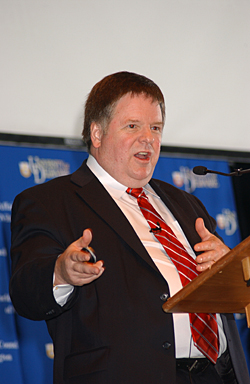Reifsnyder's presentation, "Making Climate Change Policy for the U.S. Government," was the fourth lecture in UD's six-part spring Global Agenda lecture series, “Boiling Point: International Politics of Climate Change.”
Before introducing Reifsnyder, UD President Patrick Harker announced that the University has signed two agreements--the American College and University Presidents Climate Commitment and The Talloires Declaration by the Association of University Leaders for a Sustainable Future--formalizing UD's commitment to reducing the institution's environmental impacts.
“These are challenging times for the entire planet, and the signing of these two documents reflects our intention that this University must be an active and dynamic force in addressing these global issues,” Harker said.
In introducing Reisynder, Harker noted that, “Reifsnyder has been developing, negotiating and implementing climate change policy for the United States government since 1989. He was in on the ground floor, helping to negotiate the original U.N. Framework Convention on Climate Change and was a member of the U.S. diplomatic team at the Bali climate change conference last December.”
Reifsnyder began his presentation by explaining what it's like on the international negotiating front. “We have now 181 parties to the framework convention on climate change, not quite all the countries in the world but close.”
The convention meets twice a year and about 10,000 people are involved, he said, and countries with similar interests form negotiating groups that first must appease each other before approaching a dissimilar group and arriving at any general agreements affecting the climate system. Keep in mind, Reifsnyder noted, that many of these countries have economies and/or political systems that are in transition. Making it more difficult, he said, are language barriers.
During a question-and-answer session, Reifsnyder was asked if the diplomats who take part in climate change-negotiations are more concerned with protecting their own interests than arriving at consensus.
“No," Reifsnyder said. “All of the individuals involved in the process really do care, at different levels, about what happens. We all care about the climate, we all care about economies, we all care about the well-being of our citizens. We want to take action, to respond, but it's very complicated. There are so many different points of view, so many problems within and between countries that what sometimes seems lost in these huge multinational negotiating sessions is a common denominator,” he said.The Global Agenda lecture series is organized and mediated by Ralph Begleiter, Rosenberg Professor of Communication and Distinguished Journalist in Residence at UD. All lectures begin at 7:30 p.m. on the designated Wednesday and are held in Mitchell Hall.
Upcoming Global Agenda presentations include:
Wednesday, May 7: John Hofmeister, president of Shell Oil Company and adviser to the American Petroleum Institute and the U.S. Department of Energy, will lecture on achieving energy security through sound public policy.
Wednesday, May 14: “Implications for National Security” with Maj. Gen. Richard L. Engel USAF (Ret.), who is U.S. Deputy National Intelligence Officer for Science and Technology in the Office of the Director of National Intelligence. He has served as a senior military analyst with the Strategic Assessments Group of the Office of Transnational issues of the Central Intelligence Agency.
The series is free and open to the public. For more information, visit [www.udel.edu/global].
Article by Barbara Garrison
Photos by Duane Perry



